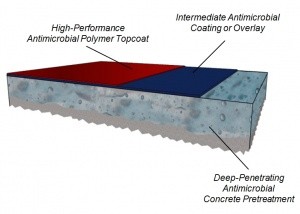You invest heavily in time and money making sure your food manufacturing facility meets the high standards of your sanitation program. Your objective is to do everything you can to effectively control contamination and implement food flooring sanitation where you can.
Controlling Bacteria is a Constant Battle
Your Hazard Analysis and Critical Control Points (HACCP) programs form the foundation of your battle against contamination. The Critical Control Points (CCP) are where you have to be proactive in your ongoing cleaning programs. If you are responsible for food processing sanitation, you want to be sure to use the most effective tools and techniques available, like antimicrobial certified flooring.
What is Happening Deep Within Your Concrete Floors?
Your concrete floor is a naturally porous material that can provide an ideal environment for harmful microbes to thrive. Water seeping into the crevices of the concrete provides a key element for nurturing another source of contamination right under your feet. Top coatings can aid in food flooring sanitation, but repeated abrasion, building movement and wash downs can create cracks that will allow contamination to grow deep within the substrate. You repair your floor and wall coatings during annual maintenance shutdowns, but how do you protect your concrete substrates from potential contamination throughout the nsider a concrete pre-treatment option. Applying an antimicrobial colloidal pre-treatment product prior to installation of a polymer coating or resurfacing system will help control this potential source of contamination. In the food & beverage processing industry, this fits in very well with FSMA (Food Safety Modernization Act) and HACCP (Hazard Analysis and Critical Control Points) protocols.
wall coatings during annual maintenance shutdowns, but how do you protect your concrete substrates from potential contamination throughout the nsider a concrete pre-treatment option. Applying an antimicrobial colloidal pre-treatment product prior to installation of a polymer coating or resurfacing system will help control this potential source of contamination. In the food & beverage processing industry, this fits in very well with FSMA (Food Safety Modernization Act) and HACCP (Hazard Analysis and Critical Control Points) protocols.
Eliminate This Risk of Contamination From Your Floor
By pre-treating your concrete floor or wall substrate with an antimicrobial colloidal product, you can achieve a host of benefits, but most importantly the peace of mind that your concrete has an active antimicrobial presence that will help combat contamination for years to come and take care of food flooring sanitation.
.
The Advantages of Pre-Treating Your Concrete Substrate:
-
- Limits moisture and vapor transmission
-
- Reduces undercutting of coatings in wet environments
-
- Penetrates floors 3” to 6”
-
- Permanently integrally seals concrete
-
- Preserves matrix integrity
-
- Increases surface abrasion resistance
-
- Adds density to concrete
-
- Improves thermal resistance
-
- Increases concrete strength
-
- Improves past carbonation effects
-
- Zero VOC/VOS content
-
- Improves acid/chemical resistance
- Lowers internal chemical reaction potential
Want to learn more about treating your processing floors with redundant, validated antimicrobial protection? Download our latest whitepaper “Antimicrobial Polymer Floor & Wall Systems: Validated Performance Technology”.


